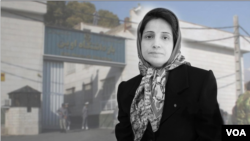One of Iran’s most prominent jailed dissidents, human rights defenders and lawyers, Nasrin Sotoudeh, has begun a second hunger strike to protest the refusal of the country’s Islamist rulers to free political prisoners endangered by coronavirus outbreaks in notorious Iranian jails.
Speaking to VOA Persian in a Tuesday interview from Tehran, Sotoudeh’s husband, Reza Khandan, said his wife started her latest hunger strike earlier in the day at the city’s Evin prison, where she has been detained since June 2018. He said Sotoudeh made the hunger strike open-ended but could halt the protest if at least some of her demands are met.
Khandan also shared with VOA an August 11 letter written by his wife and addressed to human rights defenders, explaining why she was demanding the release of political prisoners such as herself from overcrowded and unsanitary Iranian jails infested with the coronavirus.
“The conditions of political prisoners [in Iran] have become so difficult that it is impossible to continue their detention under these oppressive conditions,” Sotoudeh wrote.
Iran temporarily released tens of thousands of prisoners from its prisons in March as the nation’s coronavirus outbreak intensified but refused to release dissidents sentenced to more than five years in prison for peaceful activities designated as national security offenses.
Sotoudeh said many such dissidents were now eligible for conditional parole under recent reforms to Iranian law, but authorities were denying them their rights to seek judicial relief.
Khandan said his wife had written to prison and judiciary officials several times in recent months to raise concerns about living conditions in jails, the ability of inmates to meet visitors face to face, denials of prisoners’ leave requests and lengthy prison sentences handed to dissidents. He said she received no response to her letters.
“As all correspondences remain unanswered, I am going on a hunger strike,” Sotoudeh wrote in concluding her August 11 letter.
In a separate VOA Persian interview on Wednesday, Sotoudeh’s lawyer, Mohammad Moghimi, expressed concern that she could suffer severe mental and physical distress by refusing food because of her history of underlying health problems.
“On the other hand, we have to give the hunger-striker the right to decide for herself what to do,” he said.
Moghimi said Sotoudeh was not protesting for personal benefit but to help Iranian society as a whole.
“Her demands are legitimate, and Iran’s leaders must address them,” he said.
Sotoudeh last began a hunger strike on March 16 and continued it for several weeks as she made similar demands of Iranian authorities.
Khandan told the U.N. Human Rights Office in a video message in May that Iran responded to Sotoudeh’s most recent hunger strike by granting temporary releases to several prisoners, including women held in Evin. However, he said authorities refused to furlough dissidents charged with serious offenses and sentenced to long prison terms.
Khandan previously has said his wife is serving a more than 30-year sentence for alleged national security offenses related to her work. Prior to Sotoudeh’s 2018 arrest, she defended Iranian women detained for removing their compulsory hijabs or headscarves in acts of public protest against Iran’s ruling clerics. Rights activists have said she must serve 12 years before being eligible for parole.
Khandan, who is himself a rights activist, was detained in September 2018 and charged with subversion for publicly campaigning for the release of his wife. He was released in December 2018 and sentenced the following month to six years in prison but has remained free pending an appeal.
In a July 27 Facebook post, Khandan said he learned that a Tehran prosecutor had frozen his wife’s accounts at Pasargad Bank in an apparent effort to pressure the couple financially. He vowed not to remain silent in the face of what he called an “inhumane act.”
In his VOA interview, Khandan said he was concerned that Iranian authorities may seize the assets and property of other activists as well.
“This is a serious danger to all political prisoners and rights activists in Iran,” he said.
There was no comment in Iranian state media about Sotoudeh’s new hunger strike or the latest remarks made by her husband.
This article originated in VOA’s Persian Service. Click here and here for the original Persian versions of the story.




